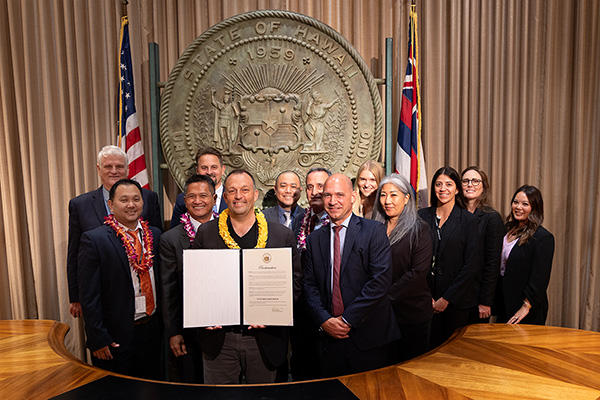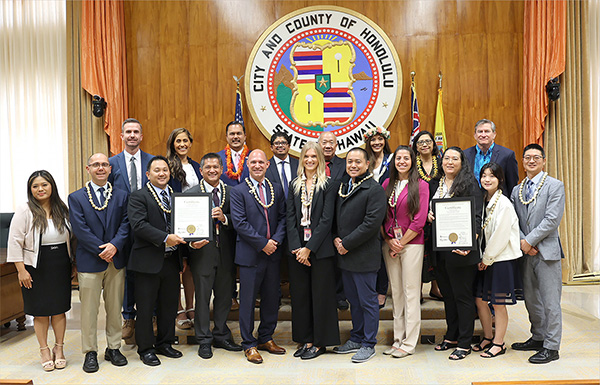Gov. Green and Honolulu City Council Honor Juvenile and Family Drug Courts During National Treatment Court Month
Posted on Jun 14, 2024 in Featured News, News & Reports
Front row, from left: Gov. Josh Green and Judge Brian Costa. Second row: JDC Supervisor Derek Sumida, JDC Section Administrator Joel Tamayo, Judge Matthew Viola, and JDC Probation Officer Lisa Ogata. Third row: Chief Justice Mark Recktenwald, Judge Robert Brown, JDC Probation Officers Christopher Soria, Jana Leyh, and Sabrina Rodriguez, Program Specialist Bridgette Bennett, and Coalition for a Drug-Free Hawaii Family Therapist Trysha Bodden.
Juvenile Drug Court and Family Drug Court staff and judges were recognized by Gov. Josh Green, MD, at a proclamation ceremony on May 24 and by the Honolulu City Council at an honorary certificate program on May 15 at Honolulu Hale.
Gov. Green presented the judges and staff members with a proclamation that recognized the six drug courts statewide as being “successful and efficacious” and said, “I’m grateful for this rigorous program that you have created and helped thousands of people to graduate from. I want to honor you for your work. You’ve all been incredible.”
Gov. Green emphasized that the Drug Court program “saves lives,” noting that individuals who engage in violent crimes often struggle with addiction and that the program has helped them lead sober, crime-free lives. “Eighty percent of Juvenile Drug Court graduates have no new convictions. That’s just an incredible number.”
Juvenile Drug Court Judge Brian A. Costa thanked the Governor and Drug Court judges statewide. He also acknowledged the diligent efforts of probation officers and administrators. “They tirelessly work with youth every day. They don’t do it just for a paycheck. It’s something that they do to help the youth and they do a fantastic job.”
Chief Justice Mark E. Recktenwald expressed his gratitude for all involved with the Drug Court program. “I want to take this time to personally thank our probation officers, community partners, our judges, and everyone who makes this program happen.”
He also expressed appreciation for Gov. Green’s support of those dealing with mental illness, citing his role in opening up a drop-off center in Kalihi as an example.
“We are so fortunate in this state to have someone who is a healthcare professional, who has dedicated his life to helping people, through his medical training, and then now is in a position to effectuate real change,” Chief Justice Recktenwald said.

Front row from left: Honolulu City Council Floor Leader Radiant Cordero, FDC Case Manager Andrew Diggs, JDC Supervisor Derek Sumida, JDC Section Administrator Joel Tamayo, Judge Brian Costa, JDC Probation Officers Jana Leyh, Christopher Soria, and Sabrina Rodriguez, FDC Program Manager Rachel Kaneshige, FDC Judicial Clerk Tori Nakagawa, and Judge Andrew Park. Second row: Councilmembers Matt Weyer, Andria Tupola, Tyler Dos Santos-Tam, Augie Tulba, Calvin Say, Val Aquino Okimoto, Vice Chair Esther Kiaʻāina, and Chair Tommy Waters.
Juvenile Drug Court and Family Drug Court staff and judges were also recognized by the Honolulu City Council at an honorary certificate presentation on May 15.
Councilmember Matt Weyer led a presentation that highlighted the achievements of Hawaiʻi’s treatment courts in serving the community.
“Treatment courts are considered the most successful justice intervention for individuals with substance abuse and mental health disorders,” he said. “When coupled with compassion, treatment courts can lead individuals into lives of recovery and stability. The state of Hawaiʻi’s Juvenile Drug Court and Family Drug Court are two such treatment courts.”
He also noted that since the implementation of Hawaiʻi’s first treatment court in 1996, “over 2,000 individuals have graduated and found success in improving their lives,” and that since 2002, 317 have graduated from Family Drug Court program.
“Mahalo to you for your tireless service every day to improve the lives of individuals and families in our community and to keep us safe,” he said.
Among the Judiciary staff honored at the ceremonies were Judge Brian Costa, Juvenile Drug Court Section Administrator Joel Tamayo, Juvenile Drug Court Supervisor Derek Sumida, and Family Drug Court Program Coordinator Rachel Kaneshige who shared their observations on why the Drug Court program is successful.
Tamayo said that the program supports much needed treatment for offenders and also speeds up the resolution of drug cases.
Sumida commented, “Juvenile Drug Court connects our at-promise youth with the necessary structure, treatment interventions, and pro-social activities, as well as educational opportunities for their families.”
Rachel Kaneshige said that many individuals enter Family Drug Court separated from their children, and are grappling with unaddressed trauma, financial hardships, and homelessness. Family Drug Court assists them in addressing these issues.
“At the time of their graduation, participants will have been reunified with their children, demonstrated an ability to live a sober lifestyle, have stable housing and finances, and have engaged in employment, school, or volunteer work,” Kaneshige said.
